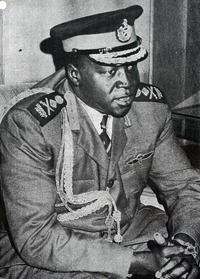
Idi Amin
Actor
Idi Amin Dada (ˈiːdi_ɑːˈmiːn; 2816 August 2003) was a Ugandan political leader and military officer who served as the President of Uganda from 1971 to 1979. Amin was born in either Koboko or Kampala to a Kakwa father and Lugbara mother. In 1946 he joined the King's African Rifles (KAR) of the British Colonial Army. Initially a cook, he rose to the position of lieutenant, taking part in British actions against Somali rebels in the Shifta War and then the Mau Mau rebels in Kenya. Following Uganda's independence from the United Kingdom in 1962, Amin remained in the armed forces, rising to the position of major and being appointed Commander of the Army in 1965. Aware that Ugandan President Milton Obote was planning on arresting him for misappropriating army funds, Amin launched a 1971 military coup and declared himself President. During his years in power, Amin shifted from being a pro-western ruler, enjoying considerable Israeli support to being backed by Libya's Muammar Gaddafi, Zaire's Mobutu Sese Seko, the Soviet Union, and East Germany. In 1975, Amin became the chairman of the Organisation of African Unity (OAU), a Pan-Africanist group designed to promote solidarity among African states. During the 1977–1979 period, Uganda was a member of the United Nations Commission on Human Rights. Amin did, however, have the support of the US Central Intelligence Agency, which helped deliver bombs and other military equipment to Amin's army and took part in military operations with Amin's forces in Uganda. In 1977, when Britain broke diplomatic relations with Uganda, Amin declared he had defeated the British and added "CBE", for "Conqueror of the British Empire", to his title. Radio Uganda then announced his entire title: "His Excellency President for Life, Field Marshal Alhaji Dr. Idi Amin Dada, VC, DSO, MC, CBE". Dissent within Uganda and Amin's attempt to annex the Kagera Region of Tanzania in 1978 led to the Uganda–Tanzania War and the demise of his eight-year regime. Amin then went into exile, first in Libya and then in Saudi Arabia, where he lived until his death on 16 August 2003. Amin's rule was characterized by rampant human rights abuses, political repression, ethnic persecution, extrajudicial killings, nepotism, corruption, and gross economic mismanagement. The number of people killed as a result of his regime is estimated by international observers and human rights groups to range from 100,000 to 500,000.
Idi Amin Dada (ˈiːdi_ɑːˈmiːn; 2816 August 2003) was a Ugandan political leader and military officer who served as the President of Uganda from 1971 to 1979.
Amin was born in either Koboko or Kampala to a Kakwa father and Lugbara mother. In 1946 he joined the King's African Rifles (KAR) of the British Colonial Army. Initially a cook, he rose to the position of lieutenant, taking part in British actions against Somali rebels in the Shifta War and then the Mau Mau rebels in Kenya. Following Uganda's independence from the United Kingdom in 1962, Amin remained in the armed forces, rising to the position of major and being appointed Commander of the Army in 1965. Aware that Ugandan President Milton Obote was planning on arresting him for misappropriating army funds, Amin launched a 1971 military coup and declared himself President.
During his years in power, Amin shifted from being a pro-western ruler, enjoying considerable Israeli support to being backed by Libya's Muammar Gaddafi, Zaire's Mobutu Sese Seko, the Soviet Union, and East Germany. In 1975, Amin became the chairman of the Organisation of African Unity (OAU), a Pan-Africanist group designed to promote solidarity among African states. During the 1977–1979 period, Uganda was a member of the United Nations Commission on Human Rights. Amin did, however, have the support of the US Central Intelligence Agency, which helped deliver bombs and other military equipment to Amin's army and took part in military operations with Amin's forces in Uganda. In 1977, when Britain broke diplomatic relations with Uganda, Amin declared he had defeated the British and added "CBE", for "Conqueror of the British Empire", to his title. Radio Uganda then announced his entire title: "His Excellency President for Life, Field Marshal Alhaji Dr. Idi Amin Dada, VC, DSO, MC, CBE".
Dissent within Uganda and Amin's attempt to annex the Kagera Region of Tanzania in 1978 led to the Uganda–Tanzania War and the demise of his eight-year regime. Amin then went into exile, first in Libya and then in Saudi Arabia, where he lived until his death on 16 August 2003. Amin's rule was characterized by rampant human rights abuses, political repression, ethnic persecution, extrajudicial killings, nepotism, corruption, and gross economic mismanagement. The number of people killed as a result of his regime is estimated by international observers and human rights groups to range from 100,000 to 500,000.
Idi Amin Movies & TV Shows - Watch Online


